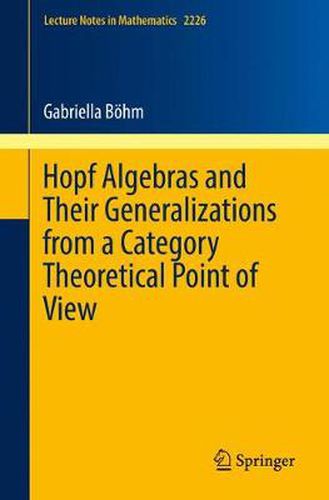Readings Newsletter
Become a Readings Member to make your shopping experience even easier.
Sign in or sign up for free!
You’re not far away from qualifying for FREE standard shipping within Australia
You’ve qualified for FREE standard shipping within Australia
The cart is loading…






This title is printed to order. This book may have been self-published. If so, we cannot guarantee the quality of the content. In the main most books will have gone through the editing process however some may not. We therefore suggest that you be aware of this before ordering this book. If in doubt check either the author or publisher’s details as we are unable to accept any returns unless they are faulty. Please contact us if you have any questions.
These lecture notes provide a self-contained introduction to a wide range of generalizations of Hopf algebras. Multiplication of their modules is described by replacing the category of vector spaces with more general monoidal categories, thereby extending the range of applications.
Since Sweedler’s work in the 1960s, Hopf algebras have earned a noble place in the garden of mathematical structures. Their use is well accepted in fundamental areas such as algebraic geometry, representation theory, algebraic topology, and combinatorics. Now, similar to having moved from groups to groupoids, it is becoming clear that generalizations of Hopf algebras must also be considered. This book offers a unified description of Hopf algebras and their generalizations from a category theoretical point of view. The author applies the theory of liftings to Eilenberg-Moore categories to translate the axioms of each considered variant of a bialgebra (or Hopf algebra) to a bimonad (or Hopf monad) structure on a suitable functor. Covered structures include bialgebroids over arbitrary algebras, in particular weak bialgebras, and bimonoids in duoidal categories, such as bialgebras over commutative rings, semi-Hopf group algebras, small categories, and categories enriched in coalgebras.
Graduate students and researchers in algebra and category theory will find this book particularly useful. Including a wide range of illustrative examples, numerous exercises, and completely worked solutions, it is suitable for self-study.
$9.00 standard shipping within Australia
FREE standard shipping within Australia for orders over $100.00
Express & International shipping calculated at checkout
This title is printed to order. This book may have been self-published. If so, we cannot guarantee the quality of the content. In the main most books will have gone through the editing process however some may not. We therefore suggest that you be aware of this before ordering this book. If in doubt check either the author or publisher’s details as we are unable to accept any returns unless they are faulty. Please contact us if you have any questions.
These lecture notes provide a self-contained introduction to a wide range of generalizations of Hopf algebras. Multiplication of their modules is described by replacing the category of vector spaces with more general monoidal categories, thereby extending the range of applications.
Since Sweedler’s work in the 1960s, Hopf algebras have earned a noble place in the garden of mathematical structures. Their use is well accepted in fundamental areas such as algebraic geometry, representation theory, algebraic topology, and combinatorics. Now, similar to having moved from groups to groupoids, it is becoming clear that generalizations of Hopf algebras must also be considered. This book offers a unified description of Hopf algebras and their generalizations from a category theoretical point of view. The author applies the theory of liftings to Eilenberg-Moore categories to translate the axioms of each considered variant of a bialgebra (or Hopf algebra) to a bimonad (or Hopf monad) structure on a suitable functor. Covered structures include bialgebroids over arbitrary algebras, in particular weak bialgebras, and bimonoids in duoidal categories, such as bialgebras over commutative rings, semi-Hopf group algebras, small categories, and categories enriched in coalgebras.
Graduate students and researchers in algebra and category theory will find this book particularly useful. Including a wide range of illustrative examples, numerous exercises, and completely worked solutions, it is suitable for self-study.